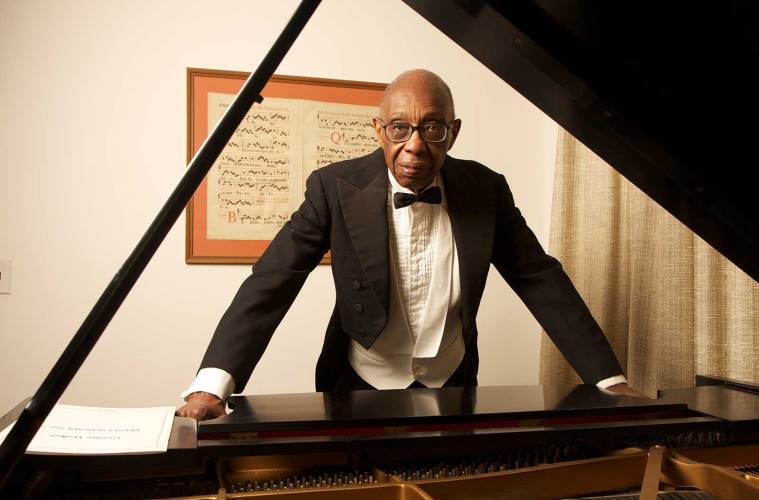Our November 12-14 concerts, Grand Panorama, features the Madison premiere of George Walker’s Lyric for Strings. Learn more about this incredible composer and what makes Lyric for Strings such a compelling piece!
Composer and pianist George Walker was born in Washington, DC, where he received his first musical training from his mother. By age 18, Walker had already graduated from the Oberlin Conservatory and went on to study at the Curtis Institute of Music where he graduated with Artist Diplomas in piano and composition, becoming the first black graduate of this renowned music school.
Walker became the first black instrumentalist to perform in New York’s Town Hall when he was presented in a debut recital there. After winning the Philadelphia Youth Auditions, Walker played with the Philadelphia Orchestra with Eugene Ormandy, the Baltimore Symphony with Reginald Stewart, and Dean Dixon and his orchestra. In 1946, George Walker composed his String Quartet no. 1 which includes Lyric for Strings, the piece we will be playing in Grand Panorama. Shortly after, Walker signed with the National Concert Artists, becoming the first black instrumentalist to be signed by a major management, and toured in seven European countries.
After teaching at Dillard University, Walker became the first black recipient of a doctoral degree from Eastman School of Music. He later attended the American Academy in Fontainebleau, France where, like many American composers of his generation, he studied with the great composition teacher Nadia Boulanger. From 1960 until he retired in 1991, Walker taught at Dalcroze School of Music, The New School for Social Research, Smith College, the University of Colorado, Peabody Institute of Johns Hopkins University, the University of Delaware, and Rutgers University where he was the Chairman of the Music Department.
Walker composed over 90 works that have been played by almost every major orchestra in the country and have won dozens of awards. In 1996, Walker became the first Black composer to win a Pulitzer Prize in Music—for his 1995 composition Lilacs for Voice and Orchestra. This piece was premiered on February 1, 1996 by the Boston Symphony Orchestra. Commissioned by the Boston Symphony Orchestra to celebrate the achievements of the renowned back tenor Ronald Hayes, the work’s four sections include the first three stanzas and the thirteenth stanza from Walt Whitman’s poem, When Lilacs Last In The Dooryard Bloom’d.
In 2018, Walker passed away at the age of 96. Read his obituaries in the New York Times and NPR.
In the second half of our November 12-14 concerts, Grand Panorama, we will play Walker’s Lyric for Strings, which became the most frequently performed orchestral work by a living composer during Walker’s lifetime. Lyric for Strings is a slow and poetic piece that he wrote as a memorial to his grandmother. It develops from a stark and simple beginning to a long free-flowing melody. This flowing music alternates with a series of solemn chords. The music reaches a restrained climax near the midpoint and fades gently away. Discover more about this piece and our entire November program in Michael Allsen’s Program Notes.
Featured photo by Frank Schramm
Listen to Lilacs for Voice and Orchestra and Lyric for Strings below.
Walker’s Lyric for Strings performed by Gustavo Dudamel and the Los Angeles Philharmonic.
Walker’s Lilacs for Voice and Orchestra: I performed by the Arizona State University Symphony Orchestra.
Learn more about Grand Panorama, and buy tickets to hear Walker’s Lyric for Strings live on November 12, 13, or 14.

